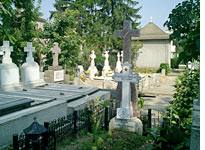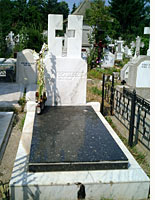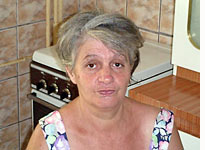Dispatches From Romania

BUCHAREST—Once a month, at 6:30 in the morning, Angela Boteza arrives at the Ghencea Civil Cemetery in western Bucharest. She walks down a gravel path to a nondescript grave, where she clears away dead leaves and candle wax and leaves yellow gladiolas in a wine bottle with a handwritten note: "May God forgive your evil deeds. Rest in peace. May the earth not be heavy upon your soul." A modest granite cross bearing a red star reveals the grave's occupant: Nicolae Ceausescu, 1918-1989. She then she goes to the other side of the cemetery to do the same at the graves of his wife Elena and son Nicu.

Boteza has been making regular visits for the past seven years, but my Romanian driver wasn't sure we had the right place. He'd seen the TV coverage of the dwindling crowd that still visits the dead dictator on Jan. 26, Ceausescu's birthday, but he had to ask directions from the cemetery groundskeeper, who led us to the sad little plot overshadowed by statelier monuments to other families. Besides Boteza's offering, the only other item decorating the resting place of Romania's president of 22 years, who was executed along with his wife on Christmas Day 1989, were some droopy flowers in a plastic cola bottle. Elena's grave looks even worse; her name is painted on a crude iron cross. Nicu, who died of liver cirrhosis in 1996, is entombed more respectfully in sleek black-and-white marble.
The story goes that Nicolae is buried backward, with his feet at the headstone, as an insult. But it's only assumed he's at Ghencea. After the revolution, it was never revealed where the couple's bodies were buried. Their graves were supposedly "discovered" in 1992. A year later, on what would have been his 75th birthday, Communist Party members donated the current headstone, and a flood of visitors came, leaving tributes and planting flowers on what it now a weedy patch. Today, only about a dozen people, mostly the curious en route to another grave, stop by on weekdays, and 30 to 40 make their way over on weekends. "They just look, stay 10 minutes, and leave," the groundskeeper said. "Nobody asks about Elena." Romanians believe Nicolae's vilified wife was behind his decision to order security forces to quell a popular democratic uprising that started in Timisoara to protest lack of freedom, food, heat, and electricity. More than 1,000 people were killed. The couple was found, arrested, tried, and killed by a firing squad within hours. (The timeline is up for debate, too, since everything was done in secret.)
A guard said party members recently asked to move Nicolae to a better location with fancier marble digs, but their request was denied.

Boteza left her phone number on her tribute, and my driver called her up. I could hear her shriek her address. "She said we can come over right now," he said.
After a quick tour of her three-room apartment, Boteza ushered us to the living room. She perched at the edge of her sofa, lit up a cigarette, and began: Ceausescu made a good life for Romanians, but he was judged rashly by people who wanted power and denied his rightful honor of a proper burial in a military cemetery. So, she has appointed herself the keeper of his legacy. She monitors the family's graves and throws out items she feels are insulting. Recently, she's tossed a dirty flag, a frayed Bible, and papier mache flowers.
Life was better under communism, she continued, parroting the refrain: "There was nothing to buy, but we had money. Now, there's everything to buy but no money." At age 52, Boteza is an unemployed accountant who gets a temporary pension of about $50 a month, through April 2005. Her son, who, she boasts, is a military officer, helps her out some. She owns her own apartment, which she bought shortly after the revolution. "I don't eat so much. I have a few cigarettes and coffee, but it's OK," she said, staring at me intently with big somber eyes. She was confident that she would find another job but admitted that she's having sleep problems.
During the 10th anniversary of the fall of communism five years ago, much was made of Romania's lack of celebration. Polls showed that four out of five Romanians were unhappy with the way they lived, and 61 percent said they would be better off under Ceausescu. Such amnesiac musings ignored the nightmares of the Stalinist dictator: the rations, the torture of anyone who opposed the regime, the deadly winters when the energy sector collapsed, the razing of villages and historical Bucharest to make way for his projects, including the so-called House of the People. His megalomaniacal monument, which is widely believed to be the second-largest office building in the world after the Pentagon, was built while the people suffered austerity measures to pay off a $10 billion foreign debt at one point.
Now the nostalgia is tempered. "Yes, it was better under communism. You had a job, a house, a car," said 20-year-old university student George Pascaru. "But you could not have your own thoughts."
But such talk makes few feel better about the giant elephant making its way east. Romania, a country of 23 million, is lumbering toward entry into the European Union in 2007. Despite robust economic growth and low inflation, corruption is rampant, and the average Romanian makes slightly more than $2,100 a year, or just 30 percent of the EU average in purchasing power.
The shiny Bucharest Mall, which opened five years ago and includes a Marks & Spencer department store, a Ruby Tuesday restaurant, and a 10-screen movie theater, is eerily empty. New cars occasionally zip down the highways, but gas-spewing Dacias still dominate *. For every new building, there are miles of crumbling, Soviet-era apartment blocks. Add some bitter, chain-smoking locals; street children; and packs of mangy stray dogs that seem to roam every city, and you get the feeling the country isn't going anywhere soon.
The mention of the European Union is met with cynical laughs. People tell how Hungarians have been forced to raid Romanian grocery stores because they were priced out of their own when their country joined the union this spring. There are rumors that EU regulations will force polluting old cars off the road, and drivers won't be able to buy new ones. And how will people buy houses?
"[President Ion] Iliescu said he will make Romania a rich country, but I just don't see it happening," Boteza said, lighting another cigarette.
Correction, Dec. 1, 2004: This dispatch entry originally claimed that "diesel-spewing Dacias dominate Romanian highways." In fact, Dacias run on gasoline. It also said that Bucharest's House of the People is the second-largest building in the world; this statement has been modified to note that it is "widely believed to be the second-largest office building in the world."